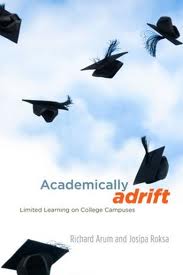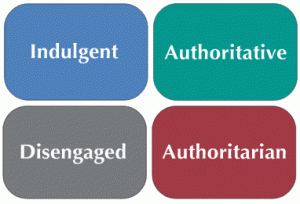 College tuition rates are soaring. More and more students go to college every year, and a bachelor’s degree is now required for entry into a growing number of professions. After all the efforts invested by parents and high school seniors to find the “perfect” college and after the tens of thousands of dollars invested in attending that college, are undergraduates really learning anything at all? For a large proportion of students, Richard Arum and Josipa Roksa’s answer to that question is a definitive “no.”
College tuition rates are soaring. More and more students go to college every year, and a bachelor’s degree is now required for entry into a growing number of professions. After all the efforts invested by parents and high school seniors to find the “perfect” college and after the tens of thousands of dollars invested in attending that college, are undergraduates really learning anything at all? For a large proportion of students, Richard Arum and Josipa Roksa’s answer to that question is a definitive “no.”
Be Curious!
 Be curious rather than judgmental.
Be curious rather than judgmental.
If you remember and apply this mantra regularly and consistently, you will be halfway there in improving relations with your teen.
Much negative behavior is driven by a need for attention or a need that isn’t being met. Responding with force or ultimatum reinforces negativity and invites resistance.
Learning Without Grades or Standardized Tests

Finland’s educational system began a process of transformation some 40 years ago that has turned it into one of the most successful in the world. According to a recent article in Smithsonian Magazine (Why Are Finland’s Schools Successful? by Conway & Hancock), this became evident in 2000, from the first results from the Programme for International Student Assessment (PISA), a standardized test given to 15-year-olds in more than 40 global venues.
What if the Secret to Success Is Failure?

More than anything, kids need a little difficulty, some challenge or deprivation that they can overcome, even if just to prove to themselves that they can. If we take that opportunity away from them, their education – both at home and at school – is “missing out on some serious parts of what it means to be a successful human.” We also inadvertently shield them from exactly the kind of experiences that can lead to character growth.
The Impact of Different Parenting Styles (Part II)
 Baumrind’s initial study and the many studies that have followed have led to the following (broadly described) conclusions about the impact of these different parenting styles.
Baumrind’s initial study and the many studies that have followed have led to the following (broadly described) conclusions about the impact of these different parenting styles.
What is Your Parenting Style? (Part I)

The study of parenting patterns and their impact on children has been greatly influenced by research done by psychologist Diana Baumrind in the 1960s, and others in her footsteps.
Using many measures of behavior, she found that parents differed on four important dimensions.
Sex Education for NY State Teens
 The new sex education requirement for all students in public middle and high schools is “long overdue,” writes the The New York Times (August 10, 2011). The sex education push is part of an initiative by Mayor Michael Bloomberg to address the needs of young people in minority neighborhoods, where blacks and Latinos are most affected by the consequences of early sexual behavior and unprotected sex.
The new sex education requirement for all students in public middle and high schools is “long overdue,” writes the The New York Times (August 10, 2011). The sex education push is part of an initiative by Mayor Michael Bloomberg to address the needs of young people in minority neighborhoods, where blacks and Latinos are most affected by the consequences of early sexual behavior and unprotected sex.
Critical Rules for Critical Conversations
 When all is said and done, we earn our teenagers’ trust by showing them we trust them, by being respectful, and by sharing power. Adolescents (and all children for that matter) who feel their parents are really interested in their world, feelings and experiences, are more likely to be open to learning from them.
When all is said and done, we earn our teenagers’ trust by showing them we trust them, by being respectful, and by sharing power. Adolescents (and all children for that matter) who feel their parents are really interested in their world, feelings and experiences, are more likely to be open to learning from them.